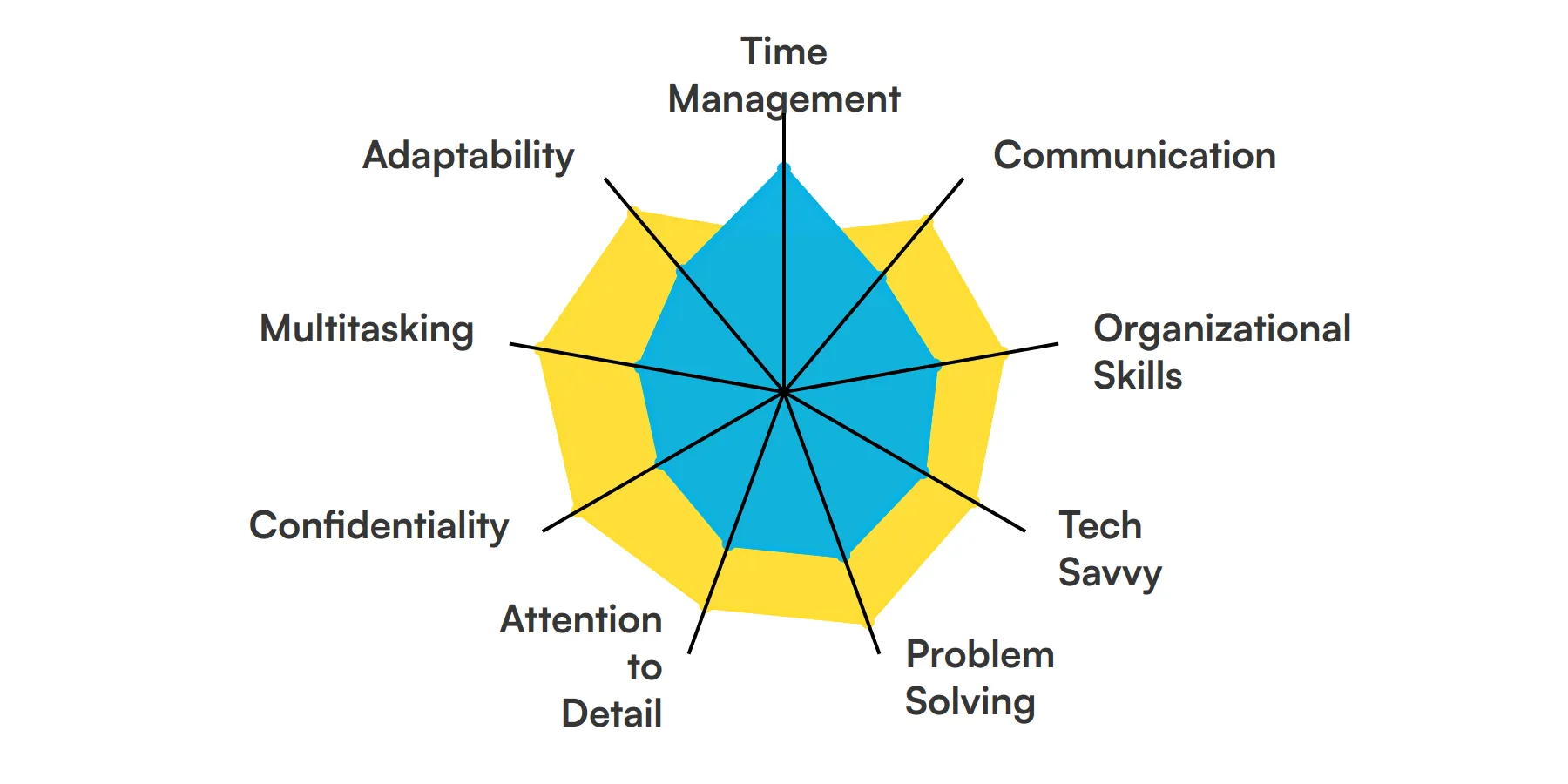This Is What Makes Our Executive Assistants Actually Indispensable

An indispensable executive assistant goes beyond traditional administrative support roles. They are a strategic partner who directly contributes to the success of the organization. Our executive assistants make important decisions, manage complex relationships with stakeholders, and provide high-level support that drives business growth.
What makes our executive assistants different? They don’t just complete tasks – they anticipate needs, solve problems, and create systems that maximize executive productivity. While generic virtual assistants might handle basic calendar management or email responses, our strategic executive assistants:
- Design comprehensive workflow systems
- Manage sensitive relationships with key stakeholders
- Provide data-driven insights for decision-making
- Create and implement efficiency-boosting processes
We’ve built our team around these advanced skills, selecting professionals who demonstrate exceptional judgment, strategic thinking, and business understanding. In this article, you’ll discover the specific skills and qualities that make our executive assistants truly invaluable to the organizations they work with.
The Changing Role of Executive Assistants
The role of executive assistants has changed a lot over time. In the past, they mainly focused on answering phones and managing emails. But now, executive assistants are crucial to a business’s success.
What Modern Executive Assistants Do
Today’s executive assistants have a wide range of responsibilities. They are not just administrative support; they are strategic partners who contribute to the growth and efficiency of the organization. Here are some key roles they play:
- Gatekeepers: Executive assistants protect their executives’ time and energy by filtering communications and prioritizing demands. They make sure that only the most important matters reach the executive’s attention.
- Project coordinators: Many initiatives in organizations require collaboration between different departments. Executive assistants take charge of managing these complex projects, ensuring that all stakeholders are aligned and deadlines are met.
- Information analysts: In today’s data-driven world, executives need relevant information to make informed decisions. Executive assistants have the skills to analyze large volumes of data and extract meaningful insights that can drive business strategies.
- Relationship managers: Building strong relationships with key stakeholders is vital for any organization. Executive assistants play a critical role in nurturing these connections by organizing meetings, following up on action items, and maintaining open lines of communication.
How Executive Assistants Boost Productivity
By effectively managing schedules, anticipating problems, and handling sensitive information with care, executive assistants significantly enhance their executives’ productivity. Here are some ways in which they achieve this:
- Strategic schedule management: Instead of simply booking appointments, executive assistants strategically plan their executives’ schedules to maximize efficiency. They consider travel time, meeting durations, and other commitments when arranging appointments.
- Proactive problem-solving: When issues arise, executive assistants don’t wait for their executives to address them. They take initiative and find solutions on their own or involve relevant parties as needed.
- System creation: To ensure smooth operations even in challenging times, executive assistants create systems and processes that streamline workflows. This could involve implementing project management tools or establishing standard operating procedures.
The Impact on Organizational Efficiency
The partnership between executives and their assistants goes beyond individual productivity gains; it has a ripple effect on the entire organization. Here’s how:
- Reduced cognitive load: Executives often have to juggle multiple responsibilities and make complex decisions regularly. By offloading certain tasks to their assistants, they can free up mental space for strategic thinking.
- Streamlined communication: With an executive assistant acting as a central point of contact, communication channels become more efficient. Messages are filtered based on priority, ensuring that important information reaches the executive promptly while less critical matters can be handled by the assistant.
- Faster decision-making: When executives have access to timely insights from their assistants, they can make decisions more quickly. This agility is especially crucial in fast-paced business environments where delays can result in missed opportunities.
- Business continuity during crises: During high-pressure situations such as mergers or acquisitions, having a reliable executive assistant becomes even more critical. They can manage logistics behind the scenes while allowing the executive to focus on negotiations or other key activities.
The value of an executive assistant goes beyond completing tasks; they become trusted advisors who understand business objectives and align their support accordingly.
This evolving role reflects the growing recognition of administrative professionals as strategic contributors rather than mere support staff. Organizations that embrace this mindset stand to gain a competitive advantage through enhanced efficiency and effectiveness at all levels.
Core Skills That Make Our Executive Assistants Indispensable

Our executive assistants possess a unique blend of skills that transform them from traditional administrative support into strategic business partners. These capabilities create measurable impact on organizational efficiency and leadership effectiveness.
1. Exceptional Organizational Skills
Calendar management stands at the core of our executive assistants’ expertise. They don’t just schedule meetings – they orchestrate complex time management systems that maximize executive productivity. Our assistants create strategic scheduling frameworks that:
- Protect focused work periods for deep thinking and strategic planning
- Build in buffer time for unexpected urgent matters
- Group similar meetings to reduce context switching
- Coordinate across multiple time zones seamlessly
Meeting coordination goes beyond basic scheduling. Our executive assistants:
- Pre-brief participants with relevant materials and context
- Set clear agendas aligned with business objectives
- Ensure proper tech setup for virtual or hybrid meetings
- Follow up with action items and accountability tracking
Workflow optimization reflects their proactive approach to operations. They identify patterns in daily activities to streamline processes:
- Creating templates for recurring tasks
- Building automated systems for routine communications
- Maintaining organized digital filing systems
- Developing standard operating procedures for common scenarios
This systematic approach to organization allows our executive assistants to anticipate needs before they arise. They prepare contingency plans, gather resources in advance, and ensure smooth operations even during unexpected challenges.
2. Strong Communication Abilities
Our executive assistants are experts at crafting clear and concise messages that resonate with everyone in the organization. They can easily switch between formal business emails with stakeholders and casual updates to the team, always using the right tone for each conversation.
But their communication skills go beyond just managing emails:
- Stakeholder Relations: Building strong relationships with important contacts while representing executives professionally
- Cross-Cultural Communication: Understanding and adapting to different business cultures
- Crisis Communication: Delivering urgent updates during critical situations
- Meeting Facilitation: Leading productive discussions and making sure action items are clear
These communication specialists act as skilled liaisons between C-suite executives and various departments, translating complex directives into actionable tasks. Their ability to manage multiple stakeholders simultaneously keeps projects moving forward, deadlines met, and team members aligned with organizational goals.
3. Professionalism and Discretion
Our executive assistants handle sensitive business information with unwavering discretion. You’ll find them managing confidential merger discussions, personnel matters, and strategic initiatives with the utmost care. They sign robust NDAs and follow strict protocols for data protection.
Their professional demeanor builds lasting trust relationships. When interacting with board members, investors, or high-profile clients, they represent your organization with polish and sophistication. This reputation management extends to:
- Screening sensitive communications
- Maintaining confidential filing systems
- Managing private calendar entries
- Coordinating discreet meetings
- Protecting access to restricted information
Your executive’s reputation stays intact through our assistants’ careful handling of privileged information and professional conduct in every interaction. Their discretion creates a secure environment where sensitive business matters remain protected.
4. Proactivity and Problem-Solving
Our executive assistants are great at spotting potential problems before they happen. You’ll see them making backup plans for important meetings, getting ready with different travel options during busy times, and coming up with backup strategies for crucial events.
When issues come up, they quickly find solutions:
- Rescheduling multiple stakeholder meetings within minutes when an executive faces unexpected travel delays
- Quickly finding replacement vendors when original suppliers fail to deliver
- Preparing last-minute briefing documents for client meetings
- Fixing technical problems during online presentations without causing interruptions
This proactive approach also applies to everyday tasks – they’ll notice when your calendar patterns change and adjust scheduling preferences accordingly, identify recurring bottlenecks in workflows and suggest ways to improve efficiency, or spot gaps in communication channels and implement better systems.
Their ability to solve problems shines brightest when things get tough, turning potential crises into smooth transitions. Instead of waiting for instructions, they assess situations on their own and take decisive action to keep things running smoothly.
5. Adaptability and Emotional Intelligence
Our executive assistants are skilled at understanding the dynamics of a situation and adjusting their approach accordingly. When unexpected requests disrupt carefully planned schedules, they remain calm and quickly reorganize tasks without missing important deadlines.
Their emotional intelligence allows them to:
- Understand non-verbal signals in high-pressure meetings
- Tailor communication styles to different personality types
- Handle sensitive conversations with tact
- Calm down tense situations before they escalate
- Build genuine relationships at all levels of the organization
You will see this skill in action when your executive assistant seamlessly manages last-minute changes to meetings, balances conflicting priorities from multiple stakeholders, or provides steady support during difficult situations. They have an instinctive understanding of when to take charge and when to step back, creating a balanced dynamic that enhances executive productivity.
Their ability to understand emotional nuances helps them anticipate needs and resolve potential conflicts before they arise, fostering a more harmonious work environment for everyone involved.
6. Tech Savviness
Our executive assistants are skilled at using the latest technology to make operations smoother and boost productivity. They are experts in:
- Advanced Calendar Management Tools
- Managing multiple time zones seamlessly
- Scheduling intelligently with AI-powered platforms
- Setting up automated reminder systems
- Virtual Collaboration Platforms
- Optimizing Microsoft Teams/Slack for better communication
- Administering Zoom/Google Meet for seamless meetings
- Managing digital documents efficiently
- Workflow Automation
- Customizing project management software to fit your needs
- Using data analytics and reporting tools effectively
- Optimizing CRM systems for better customer relationship management
Our assistants will implement time-saving automations, create efficient digital filing systems, and make the most of your existing tech tools. Their technical expertise goes beyond basic software knowledge – they actively seek out and implement new tools to improve your workflow, keeping you ahead in today’s digital business world.
7. Strategic Thinking and Analytical Skills
Our executive assistants go beyond traditional administrative roles by becoming strategic partners in decision-making processes. They analyze complex data sets, identify patterns, and present actionable insights that drive business growth.
You’ll find them:
- Creating comprehensive reports that highlight key performance metrics
- Developing strategic recommendations based on market research
- Identifying process inefficiencies and implementing solutions
- Managing cross-functional projects with multiple stakeholders
Their analytical skills also extend to budget management, where they track expenses, forecast spending patterns, and suggest cost-optimization strategies. When coordinating major initiatives, they break down complex projects into manageable phases, establish clear milestones, and ensure alignment with organizational objectives.
These strategic abilities allow them to:
- Prioritize tasks based on business impact
- Evaluate potential risks and opportunities
- Structure information for executive decision-making
- Design and implement workflow improvements
8. Networking and Negotiation Expertise
Our executive assistants are skilled at building and maintaining important professional relationships. They use their wide-ranging networks to secure better deals with vendors, speed up service delivery, and create opportunities for their executives.
You’ll find them:
- Negotiating competitive rates for corporate events and travel arrangements
- Building strong relationships with key industry contacts
- Securing last-minute reservations at exclusive venues
- Managing vendor contracts to optimize cost-effectiveness
Their negotiation skills go beyond just talking about prices. They know how to create win-win situations, whether it’s setting up complicated international meetings or organizing events with multiple vendors.
A prime example: One of our executive assistants saved their executive $50,000 on an annual conference by leveraging existing vendor relationships and negotiating bundle deals across multiple services. This shows how networking expertise can directly bring value to a business.
9. Trustworthiness and Accountability
Our executive assistants are the foundation of trust in organizations, handling sensitive information with complete confidentiality. They manage confidential documents, private communications, and personal matters with utmost professionalism.
Their accountability is evident in how they carry out tasks:
- Maintaining detailed records of all communications
- Setting up effective systems for tracking deliverables
- Creating comprehensive documentation of processes
- Double-checking every detail before execution
- Following through on commitments without fail
This reliability goes beyond just managing tasks – our EAs build long-lasting relationships based on trust. They understand the importance of their responsibilities and consistently show their dedication through:
- Proactive updates on ongoing projects
- Clear communication about potential obstacles
- Immediate reporting of sensitive issues
- Careful adherence to confidentiality protocols
- Regular updates on security practices
Their commitment to keeping information private and delivering consistent results makes them invaluable protectors of both information and organizational integrity.
10. Leadership and Teamwork
Our executive assistants are natural leaders who guide and mentor junior staff members. They play advisory roles during important projects, sharing valuable insights from their extensive experience. You’ll see them leading training sessions, developing standard operating procedures, and creating efficient workflows that benefit the entire organization.
Their collaborative approach makes complex initiatives easier to manage. By coordinating teams from different functions, they ensure smooth project execution while keeping communication channels clear. They build strong relationships across departments, find opportunities to improve processes, and actively contribute to team success.
These leadership qualities go beyond traditional assistant roles – our EAs serve as strategic partners who:
- Drive team productivity through effective delegation
- Create and implement best practices for administrative processes
- Bridge communication gaps between executives and staff
- Mentor new team members in professional development
- Facilitate productive collaboration between departments
What Makes Our Executive Assistants Different from Regular Virtual Assistants?

Regular virtual assistants are great at getting things done – like setting up meetings, entering data, and doing basic office tasks. But our executive assistants go beyond these basic jobs. They become strategic partners who contribute to your business success.
Here are the main differences:
- Understanding Business Strategy: Our EAs look at market trends, create detailed reports, and provide insights based on data to help executives make decisions.
- Managing Relationships: They build and maintain connections with important business partners, investors, and high-profile clients – opening up valuable networking opportunities.
- Handling Complex Projects: Instead of just doing one-off tasks, our EAs manage projects with multiple parts, coordinate teams from different departments, and ensure initiatives are completed.
- Communicating at an Executive Level: You get professional communication that meets your company’s standards and boosts your brand’s reputation.
- Finding Solutions Proactively: Rather than waiting for instructions, our EAs spot potential problems, come up with backup plans, and implement solutions that align with your strategic goals.
Your dedicated EA becomes an extension of your executive presence. They bring industry knowledge and business understanding that goes beyond regular administrative support.
Conclusion
Executive assistants are essential partners who change the way leaders work in today’s fast-paced business world. Their mix of strategic thinking, technical skills, and people skills makes them key players in driving business success.
These skilled professionals multiply your executive’s productivity by:
- Mastering complex calendar management
- Navigating stakeholder relationships
- Protecting sensitive information
- Driving critical initiatives forward
- Anticipating needs before they arise
As executive productivity enablers, our EAs do more than just complete tasks – they’re strategic allies who understand your business goals and work proactively to achieve them. They free up valuable executive time while ensuring nothing falls through the cracks.
The question isn’t whether you need an executive assistant – it’s whether you’re ready to embrace the competitive advantage that comes with having a strategic partner dedicated to your success. Our executive assistants don’t just support your business – they help drive it forward.

